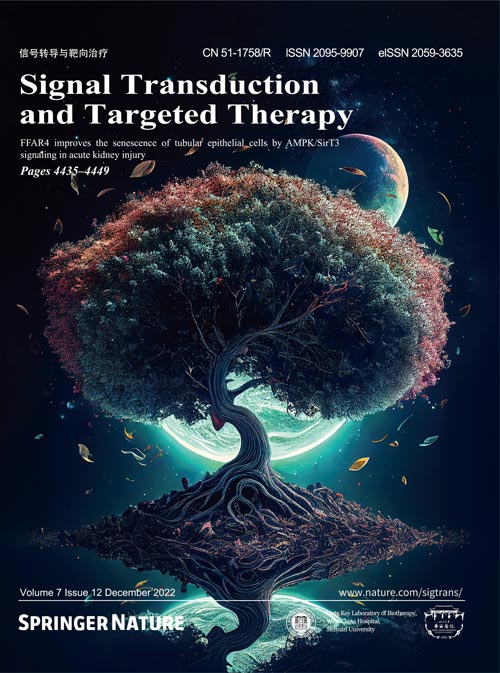Volume 7 Issue 12, Dec 2022:
Article
CD147 contributes to SARS-CoV-2-induced pulmonary fibrosis
Jiao Wu,Liang Chen,Chuan Qin
ORCID: orcid.org/0000-0002-6261-1232,Fei Huo,Xue Liang,Xu Yang,Kui Zhang,Peng Lin,Jiangning Liu,Zhuan Feng,Jiansheng Zhou,Zhuo Pei,Yatao Wang,Xiu-Xuan Sun,Ke Wang
ORCID: orcid.org/0000-0001-8913-7115,Jiejie Geng,Zhaohui Zheng,Xianghui Fu,Man Liu,Qingyi Wang,Zheng Zhang,Huijie Bian
ORCID: orcid.org/0000-0003-4690-4622,Ping Zhu &…Zhi-Nan Chen
COVID‐19 patients can develop clinical and histopathological features associated with fibrosis, but the pathogenesis of fibrosis remains poorly understood. CD147 has been identified as a universal receptor for SARS-CoV-2 and its variants, which could initiate COVID-19-related cytokine storm. Here, we systemically analyzed lung pathogenesis in SARS-CoV-2- and its delta variant-infected humanized CD147 transgenic mice. Histopathology and Transmission Electron Microscopy revealed inflammation, fibroblast expansion and pronounced fibrotic remodeling in SARS-CoV-2-infected lungs. Consistently, RNA-sequencing identified a set of fibrosis signature genes. Furthermore, we identified CD147 as a crucial regulator for fibroblast activation induced by SARS-CoV-2. We found conditional knockout of CD147 in fibroblast suppressed activation of fibroblasts, decreasing susceptibility to bleomycin-induced pulmonary fibrosis. Meplazumab, a CD147 antibody, was able to inhibit the accumulation of activated fibroblasts and the production of ECM proteins, thus alleviating the progression of pulmonary fibrosis caused by SARS-CoV-2. In conclusion, we demonstrated that CD147 contributed to SARS-CoV-2-triggered progressive pulmonary fibrosis and identified CD147 as a potential therapeutic target for treating patients with post-COVID-19 pulmonary fibrosis.
